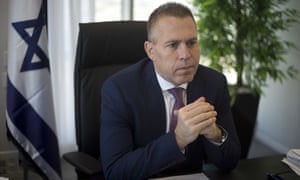What did Israel hope to gain from Priti Patel's secret meetings?
The international development secretary’s covert summer trip was a gift to Israelis who seek to influence British policy
For the second time in less than a year, Israeli efforts to discreetly influence British policy has been disclosed.
In January, the embassy official Shai Masot was caught in an al-Jazeera sting to “take down” politicians regarded as unfriendly to Israel. This time a bigger fish has been caught: the UK’s international development secretary, Priti Patel.
Official visits to Israel by senior British political figures are common, but the sensitivities are usually acute; embassy and consulate staff carefully vet the locations and personnel visited by British diplomats and ministers.
Visits are always accompanied by diplomatic staff, with agendas designed to reflect UK policy – for example, making sure to include meetings with Palestinians and groups and individuals who may not be popular with the Israeli government.
Patel’s summer trip, organised with the head of the Conservative Friends of Israel lobby group, skipped all those protocols, despite a timetable that was highly orchestrated – including a reported visit to an Israeli field hospital in the occupied Golan Heights, which could have taken place only with both Israeli military and political clearance.
To Israeli officials her private visit would have seemed like a gift, not least because those involved would have been immediately aware that, unaccompanied by diplomats, Patel was operating freelance.
Embedded in the more humdrum elements of her tour were three key encounters. The first was with the Israeli prime minister, Benjamin Netanyahu, who was “interested” in meeting her, officials told the Guardian.
Also significant were meetings with Yuval Rotem, the director general of Israel’s foreign ministry (a key appointment for Netanyahu, who is also Israel’s foreign minister), and Gilad Erdan, the abrasive minister from Netanyahu’s Likud party, who is in charge of public security, strategic affairs and information.
 Gilad Erdan, who is in charge of Israel’s attempts to counter the global BDS movement. Photograph: Ariel Schalit/AP
Gilad Erdan, who is in charge of Israel’s attempts to counter the global BDS movement. Photograph: Ariel Schalit/APThe three – as Lord Polak would have known – represent key pillars of Israel’s international diplomacy.
“[Lord Polak] has his own network,” one senior figure involved in Israeli-British advocacy told the Guardian. The source was unaware of Patel’s visit, and suggested it had been clumsily handled.
Israel’s interest in Patel is less hard to fathom. As well as wanting to promote Israel’s image, Patel’s department is at a key intersection of Israeli interest.
The Department of International Development (DfID) gives aid to the Palestinian Authority as well as human rights groups that criticise Israel, including Amnesty International. Israel has pressed DfID to cut aid to the Palestinians due to the payments given by the Palestinian Authority to the families of people killed or jailed for involvement in attacks on Israeli targets. Patel ordered a review of some funding in 2016.
Netanyahu also raised the issue of (it turns out, non-existent) UK funding for the Israeli civil rights group Breaking the Silence with Theresa May earlier this year.
But it is Erdan’s presence in meetings with Patel that is most telling because his role is largely unconnected with the work of DfID. As public security minister he has oversight of Israel’s police; as information minister he has a propaganda role; but of most interest is his position as strategic affairs minister.
Erdan has emerged as the key figure in Israel’s international efforts against the boycott, divestment and sanctions movement [BDS], and against other groups and movements that Israel accuses of seeking to delegitimise it through criticism of its human rights record.
In that context, Erdan’s ministry was asked in 2015 to “guide, coordinate and integrate the activities of all the ministers and the government and of civil entities in Israel and abroad on the subject of the struggle against attempts to delegitimise Israel and the boycott movement”.
Most controversially, Erdan has been put in charge of large-scale efforts to target foreign individuals and organisations, reportedly including staff recruited from the Mossad foreign intelligence agency, the Shin Bet domestic intelligence agency, and the military ntelligence directorate.
Among those who have fallen foul of Erdan’s ministry have been Isabel Phiri, a Malawian official in the World Council of Churches who was detained arriving at Ben Gurion airport and deported for alleged involvement in the BDS movement.
Earlier this month, Raed Jarrar, advocacy director for the Middle East and North Africa at Amnesty International – some of whose international projects are supported by DfiD – was prevented from crossing from Jordan into the West Bank. A spokeswoman for Israel’s interior ministry said Erdan had recommended he be denied entry.
Geen opmerkingen:
Een reactie posten
Opmerking: Alleen leden van deze blog kunnen een reactie posten.